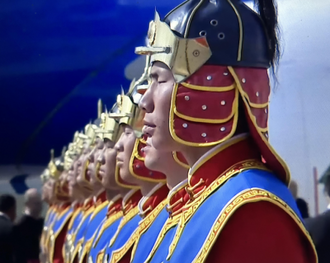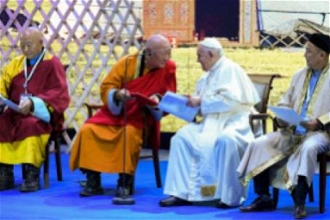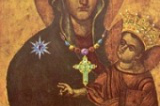Pope Francis arrives in Mongolia

Screenshot
Source: Vatican Media
Pope Francis arrived in Ulaanbaatar, capital city of Mongolia for the start of his 43rd Apostolic Visit, shortly before 10am this morning. He was welcomed at Ulaanbaatar's international Chinggis Khaan airport by Monsignor Fernando Duarte Barros Reis, Chargé d'affaires at Mongolia's Apostolic Nunciature, and the Ambassador of Mongolia to the Holy See, Ms Davaasuren Gerelmaa, and then by Church and government delegations, awaiting him on the tarmac.
The Mongolian State Honour Guard proudly held rank in their red, blue and yellow uniforms and iron helmets that recall Mongolian warriors of ancient history.
During a brief welcome ceremony at the airport, a young Mongolian woman in traditional dress gave the Pope a cup containing 'Aaruul' a traditional yoghurt drink.
The Holy Father was scheduled to rest in the afternoon after the long flight. His official meetings and events begin on Saturday morning.
During his flight to Ulaanbaatar, Pope Francis wired greetings to the leaders of each country he flew over, including President Xi Jinping of the People's Republic of China.
In his message, the Pope said: "I send greetings of good wishes to Your Excellency and the people of China as I pass through your country's airspace en route to Mongolia. Assuring you of my prayers for the wellbeing of the nation, I invoke upon all of you the divine blessings of unity and peace."
A spokesperson for China's Foreign Ministry, Wang Wenbin, said the Pope's blessing reflected "friendliness and goodwill", noting that China and the Holy See had maintained contacts in recent years.
"China is willing to continue to walk in the same direction with the Vatican, conduct constructive dialogues, enhance understanding, accumulate mutual trust, and promote the process of improving the relationship of the two sides," Mr Wang said.
Pope Francis also sent telegrams to the leaders of Italy, Croatia, Bosnia and Herzegovina, Serbia, Montenegro, Bulgaria, Türkiye, Georgia, Azerbaijan, and Kazakhstan, which he visited in on 13-15 September 2022 to attend the 7th Congress of Leaders of World and Traditional Religions.
Mongolia is the second largest landlocked country in the world (after Kazakstan). Its tiny, traditionally nomadic population, is less than 3.5 million people; of which under two percent are Christians.
After 70 years of communist regime, a satellite nation of the USSR, Mongolia underwent a peaceful revolution in 1990 and established a multi-party democracy. It adopted a new Constitution that guarantees religious freedom.
That's when the Catholic missionaries who had been exiled during the years of communism came back into the country with the task of rebuilding the Church from scratch. Today there are about 1,500 baptized Catholics in eight parishes.
They are welcome and integrated and appreciated by authorities and by the people also thanks to the many social, health care and educational programmes they run for the poor, the elderly, the disabled, and the abandoned.
The young Church is headed by the College of Cardinals' youngest Cardinal, Giorgio Marengo, whom Pope Francis elevated to Cardinal during the Consistory in August 2022.
One issue the missionaries hope will be placed on the table in the wake of the Pope's visit regards the visas they need to be able to live and work in the country.
Despite their commitment to social services, the missionaries - many of whom have worked in the country for years and learned the language - receive only short-term visas and have to go abroad every three months without knowing whether they will be allowed to come back. For every single (expensive) missionary visa, the government requests the missionaries employ five local people.
In a world ruptured by war and the threat of nuclear catastrophe, Mongolia proudly upholds its 'nuclear-weapon-free status'. In 2022, Mongolia celebrated the 30th anniversary of the status with a regional round-table gathering scholars and experts in Ulaanbaatar to discuss the importance, challenges and prospects of Nuclear-Weapon-Free Zones (NWFZ) development.
In 1992, Mongolia, as a State committed to non-proliferation of nuclear weapons in all its aspects and to achieving nuclear disarmament, declaring its territory a nuclear-weapon-free zone and proposing to have that status internationally guaranteed. Mongolia's initiative was welcomed by nuclear-weapon and non-nuclear-weapon States alike. It is still working to consolidate and strengthen that status.
The Pope's visit to Mongolia comes as he drafts the second part of his encyclical, Laudato si': On Care for Our Common Home, and the country has an important role to play in the environmental challenges of the times.
On the one hand, it has to urgently tackle the severe pollution problems caused by the mining industry that is exploited by foreign conglomerates, and by the fact that increasingly many poor nomadic people have flocked to the overpopulated city of Ulaanbaatar that today, hosts half the population, and burn coal and plastics in their traditional ger tents during the cold winter months, resulting in extremely poor and hazardous air quality.
On the other, Mongolia is called to protect its unique and precious ecosystems. The vast country that stands at the crossroads of Europe and Asia, occupies six different ecological zones. Mongolians uphold their ancestral land as "the second lung of the planet" noting that as the Amazon rainforest absorbs the world's carbon dioxide emissions, Central Asia filters the water that irrigates the rest of Asia.
Mongolian authorities are well aware of these issues and co-partner with different international organizations to implement sustainable development programmes.


















